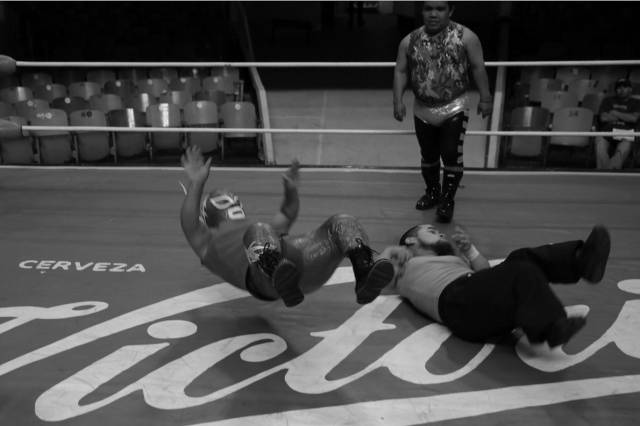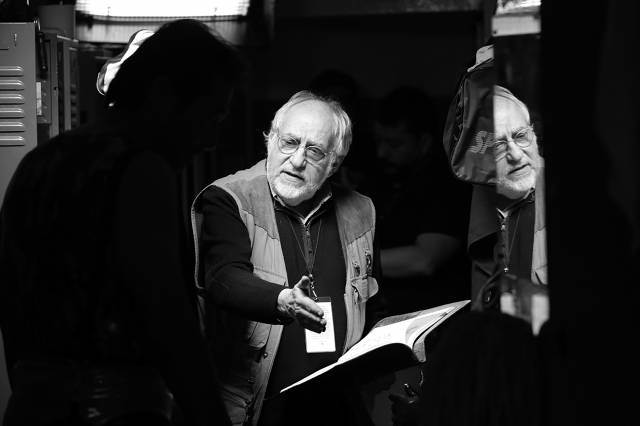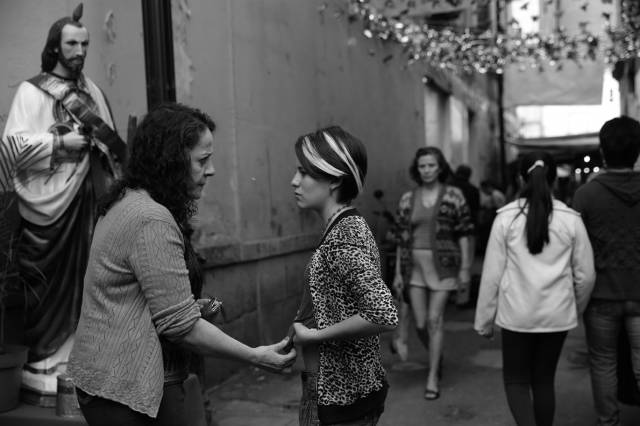

The Ripstein family name is synonymous with cinema. Arturo Ripstein isn’t only of the most prominent Latin American auteurs, his father Alfredo, was a legendary producer behind some of the most glorious films in Mexican cinema, and his son Gabriel’s first film was submitted as Mexico’s Foreign Film selection for the 2015 Oscars. Arturo Ripstein’s marvelously eerie Bleak Street encompasses an entire century of filmmaking, and announces that the future of cinema lies in a combination of novel technologies with an appreciation of the past. Set in a dreamlike Mexico City filled with endless corridors, golden light and characters out of a Rossellini film, it centers on strange the death of two mini-luchadores, and how it affects the people around them.
Filled with an urgency that’s rare in how it’s also deeply poetic, Bleak Street, gives a humanist look at the kind of stories that the media too often sensationalizes. The characters are observed, rather than exploited, the situations lead to empathy rather than sympathy, and for all of its beauty, the film doesn’t try to hide the ugliness of certain aspects of life. I had the opportunity to speak to Arturo Ripstein about the influences behind the film, his take on the democratization of filmmaking, and the difference between melodramas and telenovelas.
Even though the film is based on a recent event, it has a very classic aesthetic, which made me think of Golden Age Mexican cinema among other things. It’s also quite beautiful, which in a way makes it more horrifying. Were you trying to make such a beautiful film as a response to the current idea that everything should be shown?
I’m very grateful for you saying that. I learned all of this years ago, from Fritz Lang’s M, which has a child rapist and murderer, in a time in which you simply didn’t show things like that on screen. So the way they’d avoid censorship was using elements to suggest these events, and then audience members would complete the image with their imagination. The imagination of any audience member is much more complex than anything we can show them.
I spoke to your son Gabriel, about his film 600 Miles, which showed us how dirty and disgusting violence is. Do you think the media and news have glamorized death and violence to the point we’ve become insensitive?
They have made us immune. We go back to Hannah Arendt’s idea about the banality of evil, things like these become so common that we are anesthetized. I’ve never tried making political or social films, all I’ve ever wanted was to tell stories. I’ve always wanted to allude, rather than mention, which I feel is a more elegant and much more effective device. Allusion is better than mention.
I love that we never see blood or guts in your film, and yet some scenes really disturbed me.
(Laughs) Of course, your imagination will always be more sinister than images.

The shadows in the film suggest there is always something terrifying lurking around the corner. Were you influenced by horror films at all?
Not horror as much as German Expressionism, from the pre-war years, where the horrific things that were going on in Germany, made expressionism have an instant effect. I hope I came close in the smallest of ways to conveying the beauty of this cinema.
You’re right, even the way some of the characters move made me think of The Cabinet of Doctor Caligari…
Exactly, that was one of my influences. Lang, Pabst and Murnau, and von Sternberg’s film noirs from the 30s.
The news story that inspired your film seems to be out of another world.
It was fascinating! The thing is, as you mentioned before, we are so used to these kinds of horrifying news, that are replaced instantly by another horrifying story a few days later, that’s replaced by yet another and so on, that you don’t really notice them anymore. Inspiration comes from focusing, and this story caught my attention so much that I discussed it with my wife, and screenwriter, Paz Garciadiego, and without me asking her to write a screenplay, like we usually do, she went on her own and developed it. A few months later she presented me with the screenplay, it took me some time to read it, because reading a screenplay requires a different kind of mental state than say reading a book, I thought it was beautiful, and a couple of months later we started working on the film.
You have no idea how much I laughed in the scene where the mother takes out her cellphone and asks to have her picture taken next to the coffins.
That’s formidable, isn’t it? It’s one of those moments that reflect our current reality.
It’s grotesque, but it also made me think of how people now are even shooting movies on their phones. What’s your take on how these gadgets make cinema more democratic?
Films certainly have become more democratic, but so have painting and music. To make a painting you only need canvas, brushes and paints. To write you need pen and paper. Now go and write them...that’s the complicated part. Anyone can do it, that’s true, but whether they will be good is something else.
Cinema history is in a way, also a history of its technological developments, being able to shoot with digital cameras and GoPro, or putting films on YouTube, means that there will be many films made, but a lot of them might be garbage. In democracy there is a lot of garbage, because everyone thinks they have the right to do something, regardless of intelligence, talent or studies. Access to the gadgets is what makes it democratic, but this doesn’t mean they will do good things. But behind the garbage there are always gems, which are what will help sustain our artform

You make melodramas and many people feel this is a lesser genre. I believe that classic melodramas are sublime, but do you feel that telenovelas for instance have made melodramas lose some of its power? I love for instance how you give Sylvia Pasquel, Patricia Reyes Spíndola and Nora Velázquez, these beautiful parts that seem to come out of Neorealist films.
Exactly, the difference between melodramas and telenovelas, is that the latter began as a radio genre, and television melodramas have nothing to do with English or Russian literature from the 19th century, things like Dickens or Dostoevsky. Telenovelas seek different values, I am a son of classic melodrama, in which certain values were highlighted, but it’s like taking off a glove and seeing it from the other side. Like flipping a coin and looking at the other side. I want to look at the darkest, more ferocious side. I want to believe that’s what I’m doing.
The nature of lucha libre, and the fact that the luchadores’ identity remains a mystery made me think of fairy tales. Why do you think lucha has been able to maintain this aura of enigma for so long?
It’s the clear personification of good vs. evil, masked luchadores once even represented the bad guys, then they became heroes. Lucha represents all these very interesting ambiguities, ultimately they represent good vs. evil. Like you suggest, they are very close to the terrifying Grimm fairy tales, luchadores risk their lives to defeat their opponent.
I wanted to congratulate you for your Lifetime Achievement award at the Venice Biennale. Upon receiving such an honor, do you become melancholic, or does it inspire you to want to work even more? Usually people receive Lifetime awards when they’re close to retirement, and I hope you’re not retiring anytime soon!
(Laughs) Me too! It’s a great experience undoubtedly. I received one of my first Lifetime Achievement awards in San Francisco almost 20 years ago, and I’ve been able to keep working for 20 years, I hope I can continue working for at least a few more months...Lifetime Achievement awards mean you’ve made work that hasn’t gone by unnoticed, which is always very satisfying.
As the film opens in the States, can you talk about the most surprising way Americans have reacted to your work?
In the United States they understand my movies even less (laughs) Carlos Fuentes once said that the USA was the best country to get to know yourself, but the worst country to know others. When it comes to my films this is true, I read reviews and realize they didn’t understand a single thing. They don’t understand that in the sense of “otherness”, things are different, absurd, grotesque, terrible, but the USA is known for telling the truth in the most grotesque, demential and fantastical way in the strictest sense of the word, which is also the furthest from Star Wars, things become difficult to understand. They like hyperrealism which you can see in the way films are shot, the tone of the performances and the framing, so if you don’t fit into a preconceived category they won’t understand you. And this is what happens with my films.
Bleak Street is now playing at Film Forum.